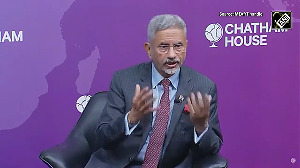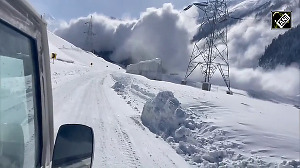There are, alas, only two instruments that a government has to tackle a negative or a positive bubble -- monetary and fiscal.
Alas, also, the Indian authorities seem to be only aware of positive asset bubbles. They will come out with noises, and policies galore, when they want to put the brakes on. Stock prices going up -- increase tax rates.
Property prices going up -- increase interest rates. Money supply growth accelerating -- increase the CRR. Bank credit going up -- increase the SLR. Inflation rate going up -- increase both tax rates and interest rates.
GDP growth accelerating -- put on new cesses, increase corporate tax rates, put on new surcharges, and increase interest rates. This is not a made-up movie but reality under the UPA government and RBI for the last five years, and especially last year.
So now that the world economy has fallen off a cliff, and we are teetering at the edge, what does the government and RBI (hereafter the Authorities) do? But you might ask, as the Authorities keep asking, what is the evidence that we are at the edge?
Let us look at industrial production. Regardless of whether we look at year-on-year figures, or whether one looks at growth in seasonally adjusted data, India would be lucky to have more than 2 per cent growth in industrial production for the fiscal year 2008/9.
Even agricultural growth is down to 2.6 per cent from 4.9 per cent the year before. So the Authorities should not need proof that the economy has slowed down considerably.
But what about inflation?
The Authorities need to realise that a major problem facing this economy, and the world, is deflation, NOT inflation.
Evidence? Consider this: For the 10 months -- April 2008 through Jan 2009 -- WPI inflation has registered 2 per cent. For the last six months, prices have been falling at an annualized rate of 6 per cent!
The CSO came out with its GDP estimates a week ago. They provide an estimate of GDP deflator inflation of 7.8 per cent for the entire fiscal year. But inflation for the first six months was already at 15 per cent annualised or 7.5 per cent for the full year.
So the Authorities' own data experts are estimating that GDP deflator inflation for the six-month period Oct 2008 to March 2009 would be ZERO. This has never happened before in India, ie for six continuous months, overall inflation in the economy would be zero.
I think the evidence of a growth and price slowdown is there and the only way one can miss it is if one is a deer frozen by headlights on a desolate highway. (What happens to such animals -- they die in accidents).
Given that there is a crisis, a deep crisis, and that there is a negative bubble of mammoth proportions, what should the government do? Well, policies should go in reverse, reverse of a positive bubble.
That means interest rates and tax rates should be cut aggressively, and public expenditures increased. Let us examine what the Authorities have done so far.
Interest rates: The RBI can now take on the mantle of being the worst central bank in the world, a title owned, until recently, by the European Central Bank. It has cut interest rates from 9 to 5.5 per cent, but it has not noticed that the inflation rate has fallen even faster.
Which is why the RBI is (strangely) pleased by its own actions of cutting the repo rate by 350 basis points in three months -- during that same period, inflation has fallen by a 1,000 basis points.
No one (maybe I speak in haste because there maybe RBI experts who believe differently) thinks inflation is a problem today. Which means inflation expectations are down, way down.
Even if a liberal 2 per cent inflation rate is assumed, corporates and individuals are borrowing at 10 to 15 per cent real, the highest in the world, and the highest by orders of magnitude.
Tax cuts: Like the RBI, the sister authority (Ministry of Finance) has cut excise and custom duties. What has been the magnitude of these tax cuts? Relative to the budget estimate of tax revenue of Rs 255,000 crore (Rs 2,550 billion), made in February 2008, actual excise and customs tax collections are down by Rs 40,000 crore (Rs 400 billion) or 0.7 per cent of GDP.
About half of it is down because of real activity being down, so net stimulus: Rs 20,000 crore (Rs 200 billion).
Expenditure Policy: So many stimulus packages -- total expenditures have increased by Rs 150,000 crore (Rs 1,500 billion). This is where seemingly the Authorities have acted. However, about Rs 60,000 crore (Rs 600 billion) is the amount spent extra on food and fertilizer subsidies, and since almost all of this extra subsidy was incurred prior to October 2008, the Centre cannot claim this as stimulus.
Another Rs 25,000 crore (Rs 250 billion) is on account of the loan waiver for farmers, which was not part of the above-the-line Budget in February 2008.
It is now part of the budget. Hence, Rs 85,000 crore (Rs 850 billion) of the extra expenditure has nothing to do with government action in response to the crisis.
Which leaves only Rs 65,000 crore (Rs 650 billion) of stimulus expenditure.
Total action on the part of the government: Rs 85,000 crore (65 plus 20) or only 1.6 per cent of GDP. And this when the fiscal gods at the IMF are arguing that countries should spend at least 2 per cent of GDP!
But the Authorities say -- you are missing out on the extra stimulus of Rs 100,000 crore (Rs 1,000 billion) in below-the-line oil and fertiliser subsidies.
But their protests are in error, huge error.
These subsidies are payment to foreigners for imports, and hence constitute a drag on the economy, a negative stimulus if you will.
So one is left with the worrying conclusion that the Authorities are unaware or misguided or both. Maybe harsh, but no one said truth cannot be bitter.
Further evidence on its ineptness can be gleaned from the government forecast of inflation for the next year -- 4 to 5 per cent.
This is the average Indian inflation for the last five years when GDP was growing at 9 per cent and, according to the Authorities, overheating. The same inflation forecast when the world has collapsed and we are on the edge? Either the Indian government, or the rest of the world, is smoking what they shouldn't.
Surjit S Bhalla is the managing director, Oxus Research & Investments. The views expressed are personal







 © 2025
© 2025